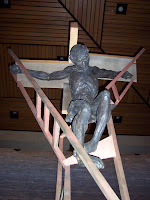 The first time I heard of an “interim pastor” was while I was in seminary. One Sunday morning, group of us visited a congregation in which a friend had done his contextual education during our first year. The pastor was serving there on an interim basis, helping to facilitate the transition from one called pastor to another. The concept of interim ministry intrigued to me. It sounded like something I might one day want to try.
The first time I heard of an “interim pastor” was while I was in seminary. One Sunday morning, group of us visited a congregation in which a friend had done his contextual education during our first year. The pastor was serving there on an interim basis, helping to facilitate the transition from one called pastor to another. The concept of interim ministry intrigued to me. It sounded like something I might one day want to try.In the Northern Illinois Synod, when a pastor resigns a call, if it is at all possible, the bishop appoints an interim pastor. The Congregation Council retains the right to refuse the appointment, but this only happens when there are good and compelling reasons. The interim pastor steps into the congregation with all the rights and responsibilities of a regularly called pastor. The beauty of this is that there is no gap in the congregation’s pastoral ministry. Word and Sacrament ministry continues while the congregation engages in a search for a new pastor.
I remember a time when congregations were left largely on their own to find supply pastors and someone to cover emergencies. In other places, a neighboring pastor was asked to cover the basics and help find the Sunday preacher. (Once in a while we still have to employ the latter “vice-pastor” model.) Congregations often felt that they did not have a real pastor. Consequently, the call process was rushed in the hope of getting a new pastor quickly.
The expectation is that the interim pastor will be compensated at the previous pastor’s level. This keeps the congregation’s budget intact and ready to receive a new pastor. In some cases, when full-time pastoral leadership is not necessary, compensation is pro-rated. If the interim pastor is serving in a ¾-time capacity, then the compensation is reduced to ¾ of the previous pastor’s compensation. We have found that most congregations appreciate having a full-time pastor available. The pastoral presence tends to keep the anxiety level of the congregation lower.
In our synod, Bishop Wollersheim gathers pastors who serve in interim capacities three or four times a year. In those meetings, the interim pastors are always thanked for their service and transition issues are discussed. Our interim pastors are mostly retired pastors with many years of service behind them. The experience they bring is invaluable. We also have four pastors who have gone through interim ministry training. They bring a skill set that is especially useful in congregations that have experienced conflict or other painful circumstances.
Interim ministry is hard work. It is not nearly as attractive to me as it was when I was a seminarian. Our synod is very fortunate that we have pastors who are willing to serve the church in this way.
Comments? Go to http://niselca.blogspot.com/. --JC

